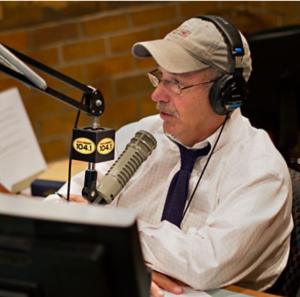
Former Orlando talker Jim Philips is out with a commentary in The Orlando Sentinel. He paints a grim picture for local radio. The former host of The Philips Phile says radio isn’t the same, and we’re worse off for it. He also advises college kids interested in radio to seek another profession.






(Apologizing for the late reply.)
Realizing a radio industry publication wants both sides of story, I’ll forgive them for accepting of an article that seems to point to total destruction for local radio. I cannot, however accept the conclusion the author presents.
It’s content that drives people to podcasts, national talk shows and music services, (At times away from radio.) And it’s content that locally owned radio stations present, keeping us ahead of the big corporations of the radio industry. The big corporations continue to dig their graves deeper and deeper serving stockholders and bigwigs instead of their listeners.
Here is a simple recipe for radio station success: Know your audience, program for them, maintain the sound quality of your station. and treat your advertisers like they should be treated–as the people who pay your paycheck–not just another “contract” contributing to 17 spots in a row after “10 in a row” music. (Yes, that happens. The day after the last I-Heart bloodbath of talent, I tuned to one Grand Rapids station and counted the spots in a break which I landed on in-progress…seventeen!!) Advertisers are part of the whole mix of localism; part of the flavor of the local station.
A small station can pay it’s bills, employ good people and have fun presenting GOOD radio with careful attention to detail in matters of clients, engineering and community even in markets where stronger large signals are present.
There’s a huge difference between “Local radio” and “Locally owned radio.” We always hear about “local radio.” I-Heart and others own local radio, but think about it. The first term describes a signal area relative to any town, anywhere, which can be owned somewhere else. The second term describes a radio station involved in its community, spending money locally, donating to causes, bringing local topics, guests, and programming to the airwaves, in an effort to perpetuate the quality of life and economic viability in and near where the staff lives.
Locally owned radio continues to serve, entertain, and compete…because we can. We’re not the Titanic waiting for help and buying time. We’re the smaller boats that can easily change with the times, provide service, and keep local talent ALIVE.
I’m sure we’re all breathless at this revelation of the end times of corporate cookie-cutter radio. However, it is a sweeping generalization that is inapplicable to smaller market community-oriented AM and FM stations.
In 1968 my high school guidance counselor suggested I look for something besides radio. Well I’m still in radio. If iheart will turn loose their undesirable stations such those one iheart executive labeled as “podunk” and return to local ownership, make the price such that owners can switch to digital AM, access the other media distribution options, then I think local will survive. Selling radio has ever been a gimme especially with the big corporate FM stations bashing local mom and pop AM stations, Again the iheart podunk term, even undercutting their own AM stations. Local mom and pop operations can’t walk off from debt like iheart, we must live in the community so we must be diligent. Colleges should produce talented announcers interested in radio rather that what I see locally as students who want to walk into a high paying executive position.
As someone who was in Radio for almost 30 years, I don’t disagree with Phillips’ observation.
While the loss of my job was due to in-house budget cuts, the Recession was around the corner. Once it ended, radio stations (as well as other businesses and industries) who had to downsize, realized that “less is more” actually worked for them.
Fast forward to a few weeks ago, when the “culling” started at iHeart; something like 1,000 jobs nationwide were killed off, as part of a “centralization” plan. (They did the same thing over ten years ago, with another of their properties; Metro Networks/Shadow Traffic.
Long story short; sure; you’ll still hear personalities; Ryan Seacrest; Elvis Duran; Bob & Tom; and a plethora of other regionally syndicated morning shows; and wherever it’s financially expedient for a given station, voice-tracking.
Should “Live and Local” survive, for the most part, it ain’t gonna be what used to be.
How many college kids do you think read the newspaper?
It doesn’t matter that people are using their phones and going to YouTube and all that stuff. I was so excited to listen to Coast on the radio and be able to get Mark wallengren whenever I could cuz I could listen to him on my radio and that will never change Cycles always repeat and come back it doesn’t matter how far out stuff gets how much technology changes people will always want to hear a real person on the radio just like people want a real voice at the end of the phone someone to talk to they don’t want automated . You guys messed up on this one. Yeah technology is great and we were listening 2K OST on our phones but I won’t be anymore because you took the people that we knew off of there you took the great voices off of there A lot of times we listen not really for the music but because we like to hear the person . you took that off of there. I think you guys made a big mistake in putting all your eggs in one basket.